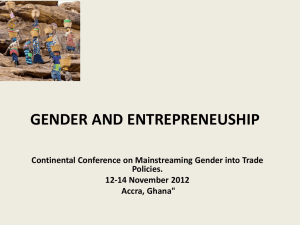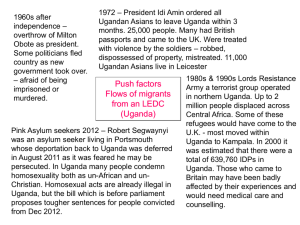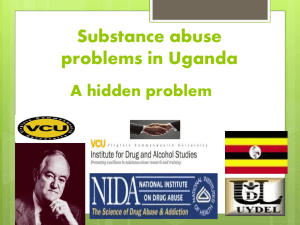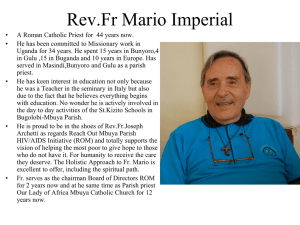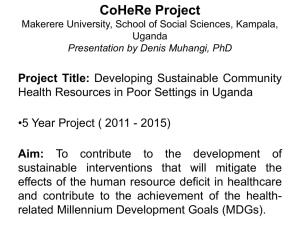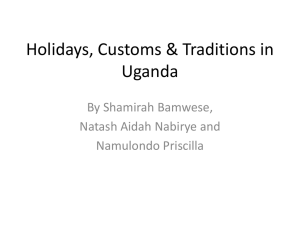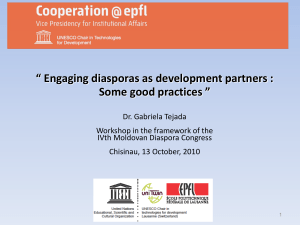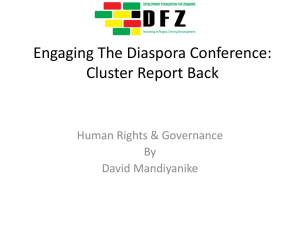Engaging Diasporas as Active Partners
advertisement
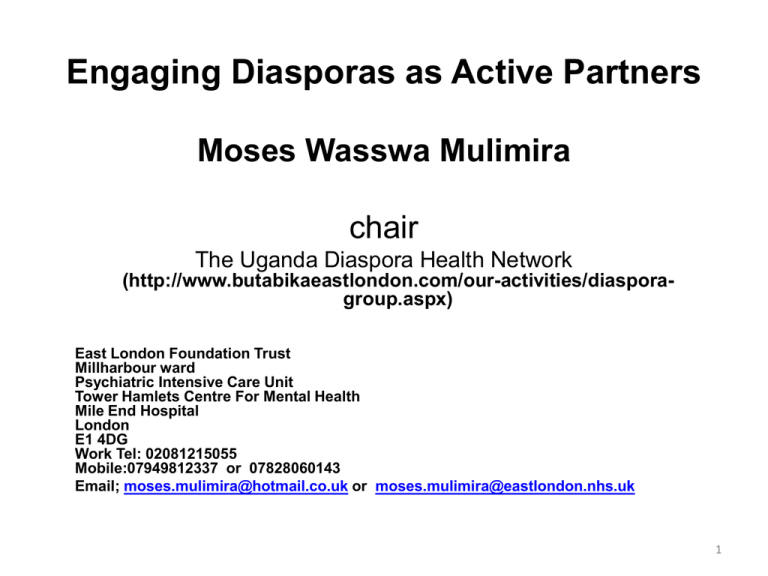
Engaging Diasporas as Active Partners Moses Wasswa Mulimira chair The Uganda Diaspora Health Network (http://www.butabikaeastlondon.com/our-activities/diasporagroup.aspx) East London Foundation Trust Millharbour ward Psychiatric Intensive Care Unit Tower Hamlets Centre For Mental Health Mile End Hospital London E1 4DG Work Tel: 02081215055 Mobile:07949812337 or 07828060143 Email; moses.mulimira@hotmail.co.uk or moses.mulimira@eastlondon.nhs.uk 1 Objective • This presentation aims to update about existing practices of diasporas and to enlighten those engaged in formulating health projects to engage diasporas as active partners 2 Who are the Diaspora • a definition of “diaspora” is proposed as: “members of ethnic and national communities, who have left, but maintain links with, their homelands” (Ionescu,2006). 3 British influence in Uganda , A Brief History: •Britain has had a presence in Uganda since 1877 Members of the British Missionary Society arrive in Buganda. •Other key dates include; 1894 - Uganda becomes a British protectorate. 1962 - Uganda becomes independent. •The long-term experience and focus on mutuality has enabled Britain to build strong relationships with generations of government leaders, policy makers and the general public in Uganda. •Cultural influence; English is one of the official languages in Uganda. Did these shared experiences lead Migrations of Ugandans to UK? 4 UGANDAN COMMUNITY IN THE UK 5 GEOGRAPHICAL LOCATION AND SIZE OF THE UGANDAN COMMUNITY IN THE UK • limited information available on Ugandan immigrants in the UK, for any official data on the size and distribution of the community. • The estimated figures are between 300,000 and 750,000 Ugandans in the UK. This includes Asian-Ugandans who came to Britain after they were expelled from Uganda by the Idi Amin Era (the International Organization for Migration, 2006). Others include; students, refugees or asylum seekers, and others that have come to the UK for varied reasons and ended up staying . • According to information available on Ugandan immigrants in the UK, 85% of the Ugandan community lives in London and the rest is widely dispersed across the UK. • In London, the highest concentration of Ugandans is in Forest Gate and Mitchum 6 7 How should we Harness Diaspora Energy and Skills in health Alliances? A Successful example; • The Butabika Link- East London NHS Foundation Trust in consultation with The Uganda Diaspora health Network UK, has managed to successfully plan and develop health projects in Uganda . • the consultation with The Uganda Diaspora community – has led to bridging the transnational space for local knowledge of what works and hence Improved its effectiveness in implementing projects in Uganda. • The Butabika Link- East London NHS Foundation Trust in consultation with The Uganda Diaspora health Network UK has made easier for both lobbying and advocating for access to health care, disability rights and human rights. a common cause in the partnership. • • The Butabika Link- East London NHS Foundation Trust in consultation with The Uganda Diaspora health Network UK has made easier to access relevant health care & other skills plus local knowledge which benefits the host and home countries ( Uganda Diaspora health network possess a range of skills including; medical, nursing, other clinical skills, IT, finance, management, advocacy). A source of Fundraising for identified projects and needs. • Hospitality role for visit exchanges in alliances. 8 What challenges remain? What are the issues to think about generally. 9 The global health funding context 10 Government policies are needed to increase Diaspora engagement with healthcare sector in Uganda. 11 Lack of understanding of Uganda healthcare system 12 Training and capacity building of Diaspora groups 13 Complex cultural issues i.e. liberal vs conservative views on gender roles, sexuality etc. 14 identifying priorities/ hierarchy of need for local population 15 Affordable travel ,security and health insurance plans 16 Diasporas at the crossroads of interests 17 Monitoring and Evaluation of Work of Diaspora groups (Competence ) 18 Lessons learnt • Partnerships with Diaspora groups can have a significant impact in healthcare provision . • Diaspora groups provide a chance for brain gain and ease brain drain. 19 Acknowledgements • Uganda Diaspora Health Network Butabika Link members • East London NHS Foundation Trust. • Dr Katy Robjant & Mr Cerdic Hall, coordinators of East London NHS Foundation Trust global health. http://www.butabikaeastlondon.com/ • Maura Buchanan, Director, Uganda UK Health Alliance 20 References • • • Ionescu, D. (2006) Engaging Diasporas as Development Partners for Home and Destination Countries: Challenges for Policymakers (IOM Migration Research Series Paper No. 26) (International Organization for Migration, 2006). BBC News - Ugandan Asians: Life 40 years on www.bbc.co.uk/news/world-africa19066465. The International Organization for Migration (2006) cited at; www.iomlondon.org/doc/mapping/IOM_UGANDA.pdf. 21


